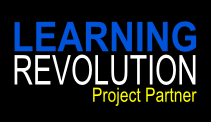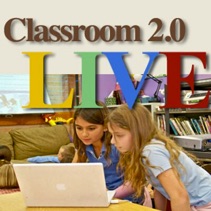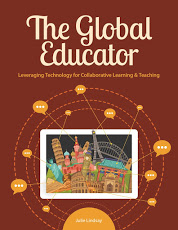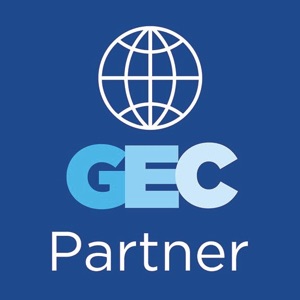Add yourself to the Frappr Map! (Click on Add! in the top right corner of the map.) Please include your name and location (city, country) and blog url. Photos and, well, everything is really optional. The more you include the easier it is for other K12 Online participants to find and connect with you. There are some real networking possiblities in this that may work to the benefit of your students. If you want to think about it you can always come back again later and add to your entry. 😉
wiki 2006
Your Turn at Adding to the Conversation
We have created a conference wiki! The intent is to make this collaborative space the place where we all enter the conversation.
This is YOUR wiki.
Please feel free to add pages and resources that relate to the four strands of the conference. If you have a presentation or resource that would be of interest around these topics then …PLEASE share. If you wanted to submit an abstract or if you submitted one that wasn’t chosen by our blind review committees- then share it here! Let’s all build together and see what an incredible time we can have.
PRE-CONFERENCE KEYNOTEDerailing Education: Taking Sidetrips for Learning
David Warlick
Raleigh, North Carolina, USA
http://2cents.davidwarlick.com/
Twitter: @dwarlick
Presentation Title
Derailing Education: Taking Sidetrips for Learning
Bio
David Warlick is a 30 year educator, author, blogger, and Web 2.0 programmer. Since 1981, he has been using information and communication technologies to help people learn, young and old. When his school could not afford any software for it’s computers, he taught himself to program and wrote award-winning instructional games, before computers could even display in color. His blog postings are read around the world, and his free online web tools are accessed millions of times a week. At heart, David Warlick is a teacher, with a contagious passion and enthusiasm for helping people discover a brand new world of teaching and learning.
David blogs at http://2cents.davidwarlick.com/
and podcasts at http://connectlearning.davidwarlick.com./
Originally posted on:
http://k12online.wm.edu/k12online2006_optz.mp4
Hello and welcome to the k12 Online Conference!

It is a great honor to be delivering the keynote address for this, the first K12 conference of this type. I must admit a certain amount of discomfort with my experience in doing this. First of all, I am not happy performing into technology. I can feel quite at ease speaking to 5000 people in a conference hall. But sitting and speaking into my camera does not come at all naturally to me. I thought it might help to take my camera out of my office and into public places, but, nope that didn’t help at all. You judge!
The second reason why I am not taking readily to this arrangement is that I really like teaching people. I like the energy that arises from a group of people who are learning something new or thinking about something in a new way. It is an electricity that hums in my ears, and the electricity of my video camera in hand, does not hum to me.
Still, we teach and we learn in order to accomplish our goals — our personal goals, our community goals, and our planetary goals. ..and the landscape within which we must teach and learn has changed dramatically in just the last few years. Therefore, we all must learn new skills, learn to think about our work in new ways, and to redefine what it is to be a teacher. I am no longer merely one who stands and teaches. I am also an information artisan, creating and crafting learning experiences that bring knowledge, skill, and joy. — and I hope to get better at it 😉
Traditional conferences act like traditional teaching and learning experiences. I face you. You face me. You all face in the same direction. In this conference we are not only facing in different directions, and not only in different locations, but you are reading this blog and watching my keynote at different times. We are free from what Chris Anderson calls the tyranny of locality (Anderson 17). You’ll spend some time paying attention to me and others, but the best part of this conference will be the time that you are reflecting on what you see, hear, and read, and then writing in your blogs and populating wikis, and then reading other people’s reflections, and reacting. This conference is not as much about teaching and learning as it is about building new knowledge.
Here are some links that may be useful to you:
- Setting up a Blogger blog — This is a print (pdf) handout that will help you to set up a blog using blogger.com.
- Setting up an EduBlogs blog — This print (pdf) handout will assist you in setting up an EduBlogs blog.
- Setting up a Bloglines Account — This print (pdf) handout will help you set up a Bloglines account so that you can aggregate discussions about this conference.
- Setting up a flickr account — Handout (pdf) for setting up a flickr account, though there will likely not be very many pictures associated with this conference — or maybe there will.
- K12 Online Conference Hitchhikr — A page where you can read blog entries posted about this conference.
- K12 Online Conference Blog Tagger — This tool will help you generate Technorati tags for your blogs that will make it much easier for you to have your blogs accessible to other conference attendees.
- My Keynote Wiki — Here you can register yourself to the wiki page and generate your own conference notebooks for taking notes during the various presentations and conversations. Through this wiki page, your notes will be available to others — and visa-versa.
Ya’ll have a wonderful Conference
Anderson, Chris. The Long Tail. New York: Hyperion, 2006.
PRE-CONFERENCE KEYNOTE Part 2Derailing Education: Taking Sidetrips for Learning
Your Wiki Assignment
The Long Tail* is a model developed by Chris Anderson, the Editor and Chief of WIRED Magazine. It describes a shift in the information landscape from an environment dominated by a limited number of products (a best-seller market) to an information environment where information is spreading out into many more products of widening variety (a niche market).
As we consider education, within this context of a changing information landscape, I am super-imposing over the Long Tail graph, a layer for education technology. On the vertical axis is a timeline, beginning at the top, with education before the personal computer, and ending at the bottom, with increasingly ubiquitous broadband access to content. Across the horizontal axis is an un-scaled spectrum of variety, in terms of variety of content and learning experience.
Assignment:
Your assignment is to think about the educational technologies that we have used in the past, and the applications you learn about and explore in this conference, and try to place them in what seems to you to be the proper positions on the long tail. There are further instructions on the assignment at the wiki page. I look forward to watching this grow and evolve.
1 Anderson, Chris. “The Long Tail.” WIRED Magazine. Oct 2004.
2 Anderson, Chris. [Weblog The Long Tail] 9 Oct 2006. 12 Oct 2006 <http://www.thelongtail.com>.
3 Anderson, Chris. The Long Tail. New York: Hyperion, 2006.
Monday Night Fireside Chat with David Warlick
Please make plans to attend the K12 Online 2006 Unleashing the Potential Kick Off Fireside chat with Preconference Keynoter David Warlick on October 16, 2006 at 6pm EDT. This informal virtual chat will take place online using Elluminate Live software.
What is Elluminate?
Elluminate is a classroom/conference tool enhanced by VoIP (live voice communication). We have used it with hundreds of teachers, some with limited technical knowledge, and it is very easy to use and understand.
Participants can access the site via any high-speed connection, using a computer with a microphone.
How do I Join the Chat?
The following link will take you into our virtual meeting place. When you click on the link the necessary software will automatically download onto your computer and then open a window that asks you to type your name. Please type your first and last name as this will appear in the participant window once you are in our virtual fireside chat room. Feel free to click on the link in advance to make sure you are able to access Elluminate. On Monday, Oct. 16 at 6:00 PM EDT simply click on the link and you will automatically join the virtual meeting.
Once we all gather in the virtual meeting space, you will be given an quick overview of how to use these very intuitive learning tools prior to beginning our chat. Here is the link for gaining access to the room:
http://tinyurl.com/rpt4a. If you would like to test your mic in advance log in to the room up to an hour in advance and someone will be there to assist you.
David Warlick and the k12 Online conference conveners look forward to chatting with you about David’s Keynote and the upcoming conference online.
See you there!
Introducing Our Continuity Editor
This post is long overdue.
We announced K12 Online on September 1, 2006. It was either the same day or the next day that Lani Ritter-Hall contacted me to offer to help in any way that she could. Over the following weeks we decided that we should have a single person responsible for posting all the presentations to the blog during the conference in order to ensure continuity. We’re doing everything we can to make this job easy but, the fact of the matter is, reviewing and posting at least 4 blog posts every day for too weeks is a big job. When I asked Lani if she’d be willing to take it on she replied, without hesitation, “sure.”
Lani is a National Board Certified teacher from Ohio in the US. She spent many years as a classroom teacher; she is currently an instructional designer for online professional development courses for eTech Ohio.
Lani also submitted a proposal for the the conference (which was part of the reason we delayed this announcement). The blind peer review committee selected hers as one of the presentations to be published for the conference … so, her plate is full … yet we couldn’t be happier to have her as a member of our team. Her poise and charm will resonate in through every post over the two weeks of the conference.
Welcome aboard Lani!
Coming Soon!
We are feverishly at work getting the last minute details worked out for the upcoming K12 Online Conference.
Preconference Keynote
We hope you will join us on Oct. 16 — here on the blog for David Warlick’s Preconference keynote. I have had a sneak peak and you are going to be so stoked at his creativity and wisdom.
Graduate College Credit
Would you like to earn graduate credit for participating in the conference? Well you can! Plymouth State University in partnership with the Shanghai American School is offering three graduate credits for K12 Conference Online participants.
To find out more… click here or on the tab at the top of the blog.
Fireside Chats
There will be several live events during the K12 Online Conference. The first scheduled event will be Oct. 16, at 6pm EDT. Make your plans to attend. Join the conference organizers and the keynote speakers in a free wheeling open-ended chats in Eluminate. This is open to anyone interested in participating. Want to know more? Click here or on the live events tab at the top of the blog.
When Night Falls
We have a planning Skypecast tonight about preparing for this event and a planning wiki. We need your help!
We are getting excited! We hope you are as well.
See you online.
grad credit – 2006
Plymouth State University in New Hampshire (http://www.plymouth.edu/graduate) in partnership with the Shanghai American School is offering three graduate credits for K12 Conference Online participants. See below for course syllabus.
The cost will be $182 per credit plus the $25 reg fee for a total cost of $571 for three graduate credits.
Jeff Utecht, author of the Thinking Stick blog and Shanghai American School tech teacher, and Alan Knobloch, Shanghai American School principal will manage the course. To register or if people have questions, they should contact Alan directly. alan.knobloch@saschina.org
Term: General Session 2006-2007 (200780)
Course Number:
Credits: 3 credits
Tuition: $182 per credit plus the $25 reg fee
Instructor of Record: Alan Knobloch
Title: Using Web 2.0 Tools in the Classroom
Course Objectives:
Participants will:
- Give concrete examples of how teachers use these tools in their classes.
- Understand how teachers plan to use these tools in the delivery of their curricular objectives.
- Explain how technologies such as Weblogs, wikis, podcasts, social bookmarking sites, RSS feeds and others can deepen learning and increase student achievement
- Identify assessment tools to measure the effectiveness of Read/Write Web technologies in their personal practice and with their students.
- Create opportunities to bring these technologies to the larger school community
- Incorporate, effectively, the tools into your personal or professional practice
- Develop a supportive, reflective virtual professional community around school-based goals
- Overcome obstacles preventing the integration of technology such as lack of access to tools/computers, filtering, and parental/district concerns for online safety.
Assignments/Products
Participants will:
View and/or listen to a minimum of 16 sessions of the K12 Online Conference (https://k12onlineconference.org) including the main keynote and each of the keynotes from the four strands.
- Post a minimum of one comment, reflection, or response to course discussion board for each session viewed.
- Read all entries to conference blog, wikis, and transcripts of chat sessions.
- Develop and implement plan to use one of the web 2.0 tools in their classroom or professional practice. Publish final product of implementation plan in local setting.
- Post project idea and respond to other participants projects.
- Complete one to two page paper reflecting on implementation plan answering the following questions.
· What was your project?
· What learning (student or adult) objective(s) was web 2.0 project designed to meet?
· How effective was the project?
· What went well?
· What did you do to contribute to that part going well?
· What part of the project did not go as well as you would have liked?
· What could you do next time to improve the project?
Contact Time
Participants will:
- View and/or listen to a minimum of 16 sessions, each session will be approximately one hour, of the K12 Online Conference including the main keynote and each of the keynotes from the four strands.
- Active participation in on-line discussions of conference sessions and course projects in an on-going expectation.
When Night Falls …
 We’re in the midst of planing the final event for K12 Online 2006. It’s called When Night Falls. The idea is to have a 24 hour long worldwide skypecast – vyew desktop sharing – networking – chat experience. As night falls across the planet, educators across the globe will come online to connect and reflect about their experiences at K12 Online 2006.
We’re in the midst of planing the final event for K12 Online 2006. It’s called When Night Falls. The idea is to have a 24 hour long worldwide skypecast – vyew desktop sharing – networking – chat experience. As night falls across the planet, educators across the globe will come online to connect and reflect about their experiences at K12 Online 2006.
For this to work we’re going to need some help to keep things going for 24 hours straight. We’re looking for a few good educators to help moderate the event. All the details are on the When Night Falls Planning Wiki. Check it out for more information.
If you’re unfamiliar with any of the tools we’ll be using in this event, not to worry. We’re putting together a series of screencasts that will teach you everything you need to know. As a matter of fact, we’re having an open, event planning skypecast on Wednesday, October 11 at 2:00 am GMT which is 9:00 pm central time in North America … my appologies to everyone in the European time zones. 😉
We’re planning a few things to do and learn over the course of each moderator’s show, but we also want to keep things fairly loose so that folks can have meaningful conversations. I’ve always found the best part of any conference to be the conversations had at the coffee break … this is going to be one helluva coffee break!
SLJ podcast on K-12 Online
School Library Journal has published a short podcast about our K-12 Online Conference that I recorded recently for them. Spread the word, we want as many educators as possible around the planet to join us in this exciting online event! 🙂

 map!
map!





